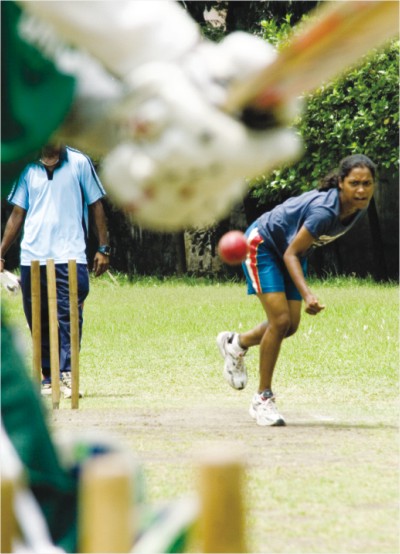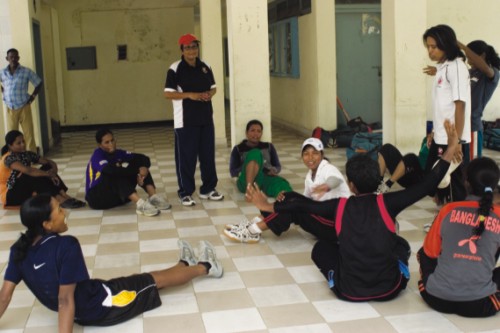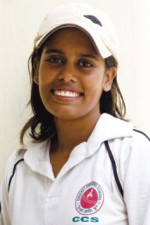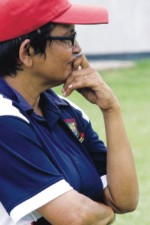
Inside
|
Breaking New Ground
In July 2004, Bangladesh Amateur Wrestling Federation (BAWF) postponed the first ever women's wrestling competition, following threats from Islamist groups. One of the religious leaders, Mohiddin Khan said: "Female wrestling is nothing but showing off their bodies in front of male audience. This is totally immoral and against the teachings of Islam."1 The event had been scheduled to take place at the Women's Sports Complex. In October, members of the Islamic Shashantantra Andolon gathered in front of the National Sports Council to protest against the country's first-ever women's football tournament, clogging traffic in the area for three hours.2 In November of the same year, the Bangladesh government stopped women from taking part in a swimming competition in Chandpur, after a group that went by the name "The Committee for Resistance to Un-Islamic Activities" threatened large demonstrations if the competition was allowed to go ahead.3 Women's sport has taken quite a beating from obscurantist groups in the recent past. And it doesn't help when the media helps to accidentally bolster the view of the bigots by publishing sexualised literature about women's sport. In a magazine piece that talked about women participating in the 2008 Olympics, a woman athlete was described as follows: "She participated at the summer Olympics as a Javelin thrower, and although her performance was not particularly one to remember, her physical splendour remains as a flag for people to reminisce on."4 But it is not just self-appointed morals police who object to women taking part in sport, there is an overall attitude in society that sport is somehow only the realm of men. Even something as simple as a woman jogging or cycling on the streets receives a bigger share of "eve teasing" than does a woman who is doing something more "acceptable" like going in a rickshaw with the hood up or sitting behind a man in a motorcycle. Somehow a woman taking charge of her own body is a culturally unacceptable thing to do. Trying to be physically fit, taking part in something that is healthy and liberating, is somehow sinful. Research conducted by Women's Sports Foundation (WSF) on Muslim women in sports revealed that Bangladeshi women "led sedentary lives with little priority given to exercise and physical activity as it conflicted with their role as a mother and home-keeper."5 What the report does not reveal is that it is not by choice that women lead such "sedentary" lives. True, though, that the days of girls having to take up sewing classes in school, while the boys go out to indulge in fitness activities like football and cricket is long past. In fact, cricket itself, which had very little existence for women even in the last decade, has evolved dramatically. The WSF researchers would have been pleasantly surprised if they had visited one of the women's cricket training camps. It's a super-charged environment, just like any men's cricket camp, and the women are just as competitive. Last month, as a matter of fact, saw a new chapter in Bangladesh women's cricket when the first Women's Club Cup tournament kicked off. The Bangladesh Cricket Board (BCB) Women's Wing organised this tournament involving eight clubs with girls from all over the country participating. The Bangladesh national team has also played several international matches at home and abroad. Now they are eyeing one-day status in the hope of participating in the World Cup. Despite overcoming a lot of odds, it is still an everyday battle, admits Mina Khatun Mona, the feisty wicket keeper of the national women's cricket team. Raised in the north-western town of Rajshahi, she points out the various forms of male-female disparity that exists within the institution. She points out that there is still a huge difference between facilities afforded to the male cricketers as opposed to the women. On a divisional level, the women players are paid a daily remuneration of Tk 25 as opposed to Tk 100 for their male counterparts. The disparity is consistent even at the national level as the men get Tk 700, while women are paid seven times less. Both play 50-over matches, use the same pitches, and are answerable to the same laws. For comparison's sake, even the notoriously traditional Wimbledon agreed to equal pay from 2007. The concept of central contracts and job quotas, prevalent in neighbouring India, are still wishful thinking for our female tigers. It was 1983 when the Bangladesh team, under the banner of Abahani, played one of their first international matches against the West Bengal President's XI at the Eden Gardens in Kolkata. This team of women cricketers later on played local matches as the Sisters' Union. Two years on, the West Bengal team came on a return visit to Dhaka. Another friendly match was played between the two teams at what was then known as the Metropolitan Women's Sports Complex. This venue was the only one that was provided.
The BCB renewed its efforts to revive women's cricket in 1997. Their efforts fell apart because of lack of proper coordination at the administrative level. In 2005, the BCB took yet further steps to rejuvenate women's cricket in the country. In April 2006 the women's wing of the national team was formed. The new committee arranged a three-month training camp at the Women's Sports Complex in Dhanmondi.6 Women's cricket took off and more and more women are taking up district-level cricket all over the country. There is a long way to go, but at least women cricketers finally have a strong footing. They are somewhere. They are someone. So exactly how was this road less travelled? "Difficult," admits Mona. "There will always be the odd-person along the way who will say something to you that makes you question whether what you are doing is really worth it." The Bangladeshi stumper admits that, had it not been for guidance and perseverance from her mentors, she would never have made it to where she is today. But for every mentor, there are ten others who would say otherwise. Mona can list numerous incidents where perfect strangers have tried to bully her with questions of ethics and morality, but she says she tries to not let it affect her. "I try to not let it affect me, because the people who matter -- my parents and my family have all been eternally supportive. Even growing up in my locality I was always the tomboy -- playing with the boys, racing them in my bike," she recalls. "No one ever objected then, and those who do now are, I feel, the narrow-minded minority." But she admits that all the players are amongst the social minority -- in having families who are progressive enough to let their daughters make an independent life decision and pursue her own dreams. Baby steps for Bangladesh women's cricket, but at least, finally, a start. In a country where jeans-clad females are critiqued as being "fast" or "corrupted by the West," women playing cricket, football and any other sports show that families are emerging from their conservative background hell. The lives of Ayesha, Mona and Lily are success stories that show us the way forward. In order to move from being the people we are to who we want to be, these early, small victories can help us on our way. But it also necessary to resist any attempts by either individuals, or obscurantist organisations playing politics with "women's role," to suffocate these pioneers in sports. Ayesha rides her own motorcycle in a city, which is committed to making women feel
uncomfortable in their public appearances. She is also a proud batswoman for the Bangladesh women's national cricket team. While studying in Dewanganj Girl's School in Jamalpur she was always involved in sporting activities. She was quite unlike the typical inhabitants of the northern district. Sharp as a tack, athletic and with an effervescent streak that is the hallmark of all sportswomen, she knew early on that being a professional athlete would be her ultimate happiness. Fast-forward two decades, and Ayesha Akter is now almost a household name. She was a district badminton champion. She was also the first ever captain of the Under-17 women's team and presently a [class-2] football referee. After coming to Dhaka, she took coaching from national cricket coach Syed Altaf Hossain from 2000 when women's cricket in the country was still in fledgling state. Her team had to wait for a long time to play matches, but her determination and dedication to the sport made her stay on. Now she is the opening batswoman for the national women's team and has played in all the international matches the country has played in. Ayesha is also studying for a BA from her home district of Jamalpur. Third among four sisters and two brothers, Ayesha's career choice has been supported proudly by all of her family.
Lily Rani Biswas comes from Gopalganj and is one of the opening bowlers for the Ansar as well as the national women's cricket team. Anyone who understands cricket knows what a demanding job this is, requiring constant practice and the pre-requisite to stay fit. When she was young she liked playing cricket with her two brothers at home. But as soon as she went out of the borders of the home, her brothers and other family members' parochial thoughts shone through. They told her she would not be able to go out into the field to play. She was a girl, they informed her, and it was not right for her to play outside where everyone could see her. Her uncle was especially intolerant of her inclinations. He made it his responsibility to scold her whenever she was spotted playing in the field. Lily, instead of giving in to the reprimands from a respected patriarch, fought back. She would wake up very early in the morning and go running around her neighbourhood, and before anyone else woke up she would be back in bed and no one would ever know she went out at all. And despite all the pressures around her she managed to make the arduous journey from her hometown to Dhaka and come to the notice of Nazma Shamim, a member of the national team committee. She even had to stay at the house of Farida Begum, the coach of the Ansar team at one point to attend a tournament. It is only after she started playing international matches and performing well that her family understood her true value. Now they are very happy and proud of their daughter playing in the national cricket team.
Farida Begum used to play danguli with the boys when she was very little. Growing up with her grandfather (on her mother's side), she very fondly remembers the very first gift her father gave her -- not a doll but a cricket bat and ball. Farida did not have the conventional upbringing that girls in our society do. When other little girls were donning red saris, alta, and glass churis, Farida found herself wearing matching lungis with her uncles. Her father always encouraged her in all kinds of sports. After completing her Masters in Bangla from Dhaka University, she took up teaching the language for a brief period, but eventually returned to her true love -- sports! She completed a bachelors in physical education. After completing a diploma in volleyball from Punjab she came back to Dhaka and joined the National Sports Council, and got appointed as the coach of the national volleyball team. For her, the choice of profession was easy, but she acknowledges that unfortunately many girls, despite aspiring to get involved in sports and having the ability, cannot take it up because of the restrictions placed on them by their families and society. 1. "Now sport bows to bigots," The Daily Star, July 5, 2004. Hana Shams Ahmed is Assistant Editor, Forum. |




